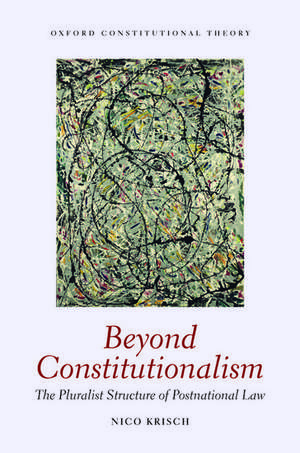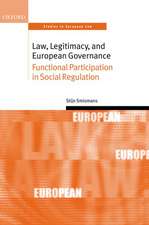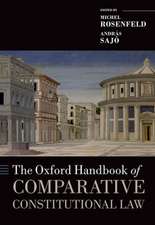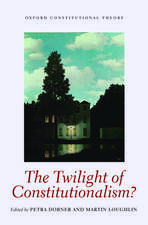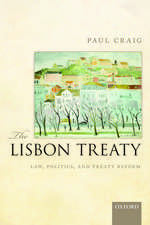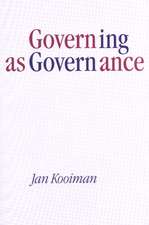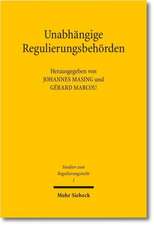Beyond Constitutionalism: The Pluralist Structure of Postnational Law: Oxford Constitutional Theory
Autor Nico Krischen Limba Engleză Hardback – 27 oct 2010
| Toate formatele și edițiile | Preț | Express |
|---|---|---|
| Paperback (1) | 360.19 lei 31-37 zile | |
| Oxford University Press – 6 sep 2012 | 360.19 lei 31-37 zile | |
| Hardback (1) | 689.37 lei 31-37 zile | |
| OUP OXFORD – 27 oct 2010 | 689.37 lei 31-37 zile |
Din seria Oxford Constitutional Theory
- 21%
 Preț: 592.17 lei
Preț: 592.17 lei - 25%
 Preț: 660.38 lei
Preț: 660.38 lei - 12%
 Preț: 661.62 lei
Preț: 661.62 lei - 12%
 Preț: 298.56 lei
Preț: 298.56 lei - 14%
 Preț: 268.76 lei
Preț: 268.76 lei -
 Preț: 289.51 lei
Preț: 289.51 lei - 30%
 Preț: 595.04 lei
Preț: 595.04 lei - 25%
 Preț: 628.46 lei
Preț: 628.46 lei - 13%
 Preț: 569.46 lei
Preț: 569.46 lei - 30%
 Preț: 591.65 lei
Preț: 591.65 lei - 30%
 Preț: 515.28 lei
Preț: 515.28 lei - 30%
 Preț: 521.33 lei
Preț: 521.33 lei - 30%
 Preț: 600.01 lei
Preț: 600.01 lei - 23%
 Preț: 367.83 lei
Preț: 367.83 lei -
 Preț: 345.44 lei
Preț: 345.44 lei - 13%
 Preț: 263.13 lei
Preț: 263.13 lei - 18%
 Preț: 219.80 lei
Preț: 219.80 lei -
 Preț: 342.53 lei
Preț: 342.53 lei -
 Preț: 336.74 lei
Preț: 336.74 lei - 18%
 Preț: 341.61 lei
Preț: 341.61 lei - 26%
 Preț: 685.83 lei
Preț: 685.83 lei - 14%
 Preț: 294.28 lei
Preț: 294.28 lei - 30%
 Preț: 595.25 lei
Preț: 595.25 lei - 12%
 Preț: 316.18 lei
Preț: 316.18 lei - 26%
 Preț: 328.53 lei
Preț: 328.53 lei - 30%
 Preț: 646.49 lei
Preț: 646.49 lei -
 Preț: 310.25 lei
Preț: 310.25 lei - 19%
 Preț: 264.69 lei
Preț: 264.69 lei - 13%
 Preț: 274.68 lei
Preț: 274.68 lei -
 Preț: 322.84 lei
Preț: 322.84 lei - 30%
 Preț: 599.25 lei
Preț: 599.25 lei - 26%
 Preț: 552.04 lei
Preț: 552.04 lei
Preț: 689.37 lei
Preț vechi: 945.27 lei
-27% Nou
Puncte Express: 1034
Preț estimativ în valută:
131.91€ • 138.09$ • 109.15£
131.91€ • 138.09$ • 109.15£
Carte tipărită la comandă
Livrare economică 25-31 martie
Preluare comenzi: 021 569.72.76
Specificații
ISBN-13: 9780199228317
ISBN-10: 0199228310
Pagini: 384
Dimensiuni: 163 x 239 x 28 mm
Greutate: 0.7 kg
Editura: OUP OXFORD
Colecția OUP Oxford
Seria Oxford Constitutional Theory
Locul publicării:Oxford, United Kingdom
ISBN-10: 0199228310
Pagini: 384
Dimensiuni: 163 x 239 x 28 mm
Greutate: 0.7 kg
Editura: OUP OXFORD
Colecția OUP Oxford
Seria Oxford Constitutional Theory
Locul publicării:Oxford, United Kingdom
Recenzii
In this eloquently written and well-documented book, Krisch embraces legal pluralism as a promising way to deal with postnational law that is characterized by an international legal order in which the centre of gravity ha[s] shifted away from the nation-state.
Krisch in this book not only presents a systematic defense of the pluralist view but also provides an incisive diagnosis of the state of our globalizing world.
Krisch's book is a pleasure to read. It contains a clearly written, original and thought-provoking defense of a pluralist understanding of postnational law.
Reviewing this book has been an enormously edifying experience...[The] book...explores important ideas and suggests new ways forward.
Nico Krisch has written one of the most lucid and circumspect contributions, which is likely to show significant repercussions in the field...In sum, Nico Krisch has written a truly wonderful book.
Krisch in this book not only presents a systematic defense of the pluralist view but also provides an incisive diagnosis of the state of our globalizing world.
Krisch's book is a pleasure to read. It contains a clearly written, original and thought-provoking defense of a pluralist understanding of postnational law.
Reviewing this book has been an enormously edifying experience...[The] book...explores important ideas and suggests new ways forward.
Nico Krisch has written one of the most lucid and circumspect contributions, which is likely to show significant repercussions in the field...In sum, Nico Krisch has written a truly wonderful book.
Notă biografică
Nico Krisch is a Professor of International Law at the Hertie School of Governance in Berlin, where he moved in 2009 after being a Senoat the Law Department of the London School of Economics and Political Science. Previously, he held research positions at Merton College, Oxford, NYU Law School and the Max Planck Institute for International Law in Heidelberg. He is the author of Selbstverteidigung und kollektive Sicherheit (Self-defense and Collective Security, 2001), a co-editor of The Emergence of Global Administrative Law (Law & Contemporary Problems, 2005), and of articles on United Nations law, on hegemony in international law, and on the legal order of global governance. He is also a member of the Executive Board of the European Society of International Law.
